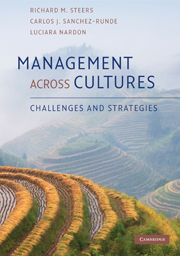Book contents
- Frontmatter
- Contents
- Exhibits
- Preface
- 1 Global realities and management challenges
- 2 Developing global management skills
- 3 Culture, values, and worldviews
- 4 Inside the managerial mind: culture, cognition, and action
- 5 Inside the organizational mind: stakeholders, strategies, and decision making
- 6 Organizing frameworks: a comparative assessment
- 7 Communication across cultures
- 8 Leadership and global teams
- 9 Culture, work, and motivation
- 10 Negotiation and global partnerships
- 11 Managing in an imperfect world
- 12 Epilogue: the journey continues
- Appendix A Models of national cultures
- Appendix B OECD guidelines for global managers
- Index
- References
11 - Managing in an imperfect world
- Frontmatter
- Contents
- Exhibits
- Preface
- 1 Global realities and management challenges
- 2 Developing global management skills
- 3 Culture, values, and worldviews
- 4 Inside the managerial mind: culture, cognition, and action
- 5 Inside the organizational mind: stakeholders, strategies, and decision making
- 6 Organizing frameworks: a comparative assessment
- 7 Communication across cultures
- 8 Leadership and global teams
- 9 Culture, work, and motivation
- 10 Negotiation and global partnerships
- 11 Managing in an imperfect world
- 12 Epilogue: the journey continues
- Appendix A Models of national cultures
- Appendix B OECD guidelines for global managers
- Index
- References
Summary
There are truths on this side of the Pyrenees that are falsehoods on the other.
Blaise Pascal Seventeenth-century philosopher, FranceThe computer is on the dock, it's raining, and you have to pay a bribe to get it picked up and delivered.
William C. Norris Founder, Control Date Corporation, USAEthical standards reside within people, not organizations. In fact, organizations have no ethical standards; it is only their members – executives, managers, and rank-and-file employees – who determine whether or not a particular company will act ethically or responsibly at any given point in time, and even this determination lies in the eye of the beholder. Ethical standards are oftentimes amorphous, conflicting, and transitory, but their impact on local communities around the world can be profound.
Consider the challenges facing the petroleum industry in doing business in Nigeria. Global economists and political observers have long suggested that Nigeria has two attributes in abundance: oil and corruption. According to The Economist, Nigeria is one of the most corrupt nations in the world. Indeed, bribery is so commonplace that they even have their own name for it: “chopping.” If this is the case, how do global companies gain access to Nigeria's vast oil reserves to help supply an insatiable world demand for petroleum? Through bribery, of course. Companies that refuse to play – and pay – by the local rules risk being shut out of this lucrative market.
- Type
- Chapter
- Information
- Management across CulturesChallenges and Strategies, pp. 363 - 403Publisher: Cambridge University PressPrint publication year: 2010



